On 23rd November 2018, the Centre for Law and Policy Research (CLPR) organised the National Constitution Society (NCS) Convention 2018. The one-day Convention took place at the Indian Institute of Human Settlements, Bangalore.
Summary of Proceedings
For the Agenda, see here
Session I: Why Does Indian Constitutional & Political History Matter?
Professor Sucheta Mahajan asserted that Constitution should be seen as emerging out of the freedom movement and not just a textual production of the Constituent Assembly. She pushed back against the narrative that the Constitution is a document drafted by a set of elites, who rather than represent the values of the people, merely borrowed Western ideas. She argued that the members of the Constituent Assembly “were giving form to ideas, practices, imaginings in the public sphere”.
Session II: Supreme Court’s Push for Equality
Co-Founder of Bebaak Collective Hasina Khan spoke about her role as an intervener in the Triple Talaq case (Shayara Bano v. UOI). She urged that personal laws must be subject to constitutional judicial review and cautioned against the general view that all Muslim personal laws are protected by freedom of religion under the Constitution. She explained the need for creating Muslim Women Groups so that conservative groups from within or political parties from outside do not hijack Muslim women’s agenda.
Next, Transgender Rights Activist Akkai Padmashali spoke of her role as a petitioner in Section 377 case (Navtej Johar v. UOI). She emphasised the role of social movements and civil society in advancing Transgender rights. She said that the Supreme Court judgment would go a long away in fighting stereotypes and stigmatisation of the transgender community.
Session III: Gender and Sexuality in the Supreme Court
Speaking on the Supreme Court judgment in Triple Talaq, Women’s Rights Lawyer Flavia Agnes highlighted a range of judicial decisions over three decades, which already ensured protection against Triple Talaq. Despite the celebrated judgment of 2017, she agreed that the case broke no new ground, as the controversial question of supremacy of un-codified personal law over fundamental rights still remains open. Drawing from the Sabarimala case (Indian Young Lawyers Association v. Kerala), she cautioned against Court ruling on religious matters unless community and civil society mobilisation on the ground supports litigation.
Human Rights Activist Arvind Narrain praised the Supreme Court’s recent judgment in Navtej Johar, which decriminalized Section 377 of the Indian Penal Code. Arvind Narrain argued that the Supreme Court must continue to embrace the doctrine of transformative constitutionalism, in order to further the rights of minorities. He argued that the ‘right to love’ and choose one’s intimate partners would reform caste, religion and sexual identity based discrimination.
Session IV: 21st Century Indian Constitution
Human Rights Activist Babloo Loitongbam spoke about how the Constitution of India 1950 applies to different regions differently. Taking the example of Manipur, one of the States where Armed Forces Special Power Act (AFSPA) is in force, he detailed how over 1000 civilians and non-combatants have been killed by Armed Forces acting under the law. However, he added that the number of killings have reduced since the Supreme Court began to monitor investigations is some fake encounter cases.
Professor Sanjay Jain said that for the constitution to be truly inclusive, it has to address discrimination based on the ideology of “ableism”. As no fundamental right addresses discrimination on the basis of disability, he said that Constitution should be amended or interpreted to account for disability rights. He said that ability-based privileges have seeped into the public culture and hardly any public spaces or infrastructure are designed with the disabled person in mind.
Session V: A National Constitution Society for India: The Need for Student Action
Professor Babu Mathew urged the students to mobilize to protect and popularize the Constitution by engaging in non-party political work. For pragmatism’s sake, he asked the students to form a ‘common minimum agenda’ to maximise student unity. He offered the students the Indian Freedom Movement as an example of how civic leaders with common intentions came together despite their differences in politics, ideology and personality.
Assistant Professor Sidharth Chauhan spoke about his own experiences in setting up societies and organising discussions around the Constitution in NALSAR. He spoke about different ways in which Students across disciplines can work towards popularising the Constitution through academic and co-curricular activities.
Session VI: Organizing a National Constitution Society: Structure and Agenda
CLPR Associate Vineeth K proposed an organizational structure for NCS. He emphasised that the society will be student led. He proposed that NCS be composed of a National Chapter and a series of Local Chapters based in colleges and universities across India.
CLPR Associate Kruthika R presented a potential agenda for 2019 to the Student Delegates. She emphasised that CLPR can provide the Student Delegates with advice on how to run social media campaigns
Professor Sudhir Krishnaswamy emphasised to the delegates that NCS will be an independent student-led body, which will be supported by CLPR.
Student Delegates Plenary Session
The Convention marked the founding of the National Constitution Society, a network of student societies in colleges and universities across all of India. This year, 31 Student Delegates were selected to attend the Convention.
The Student Delegates elected Amisha Pareek, Amith L M, Gunjan Rathore, Wardah Beg as Student Board members for 2019. CLPR nominated Akshat Bansal as the 5th member to ensure representation from the West and science/engineering school.

